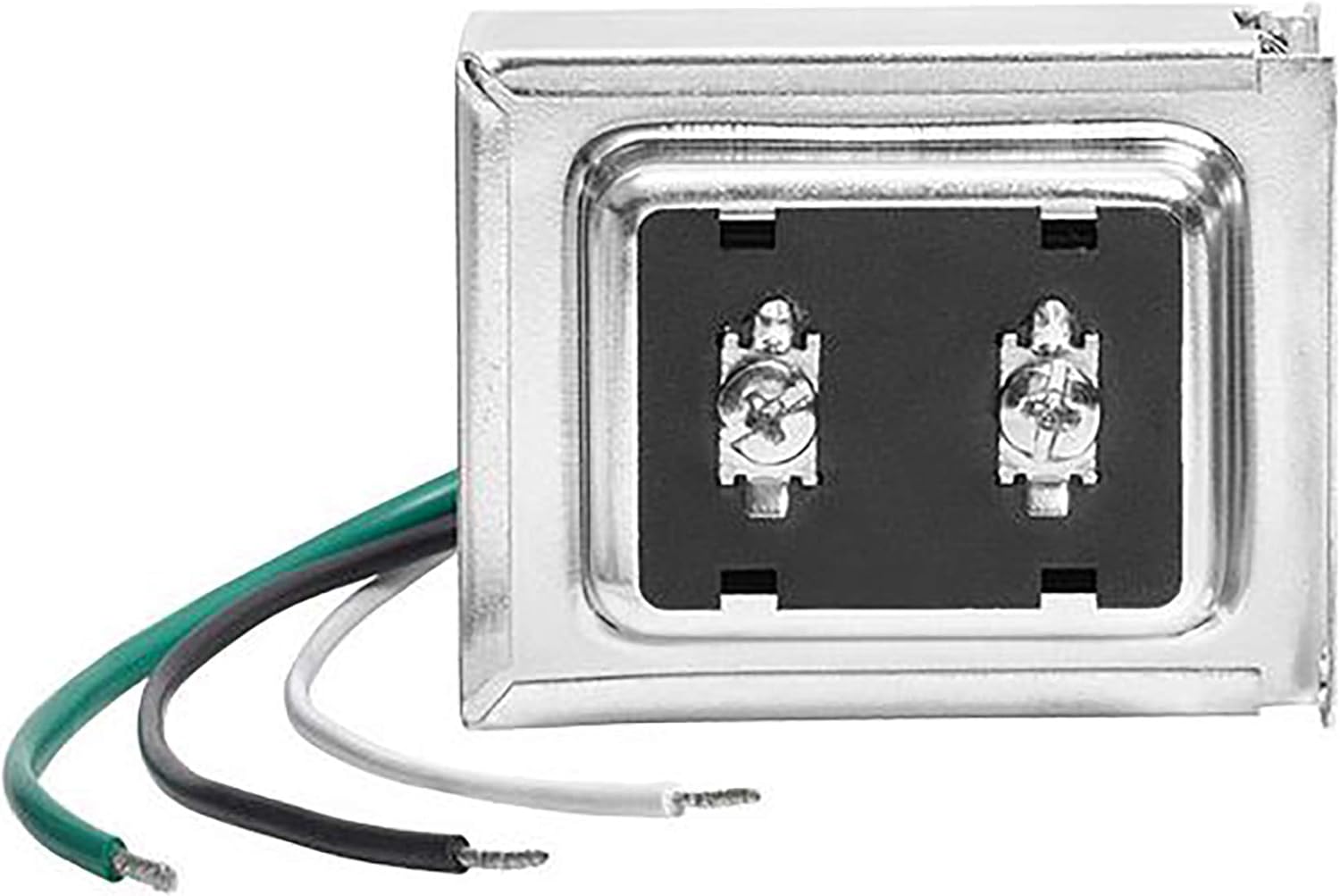Estimated reading time: 18 minutes
Introduction
In the complex world of home electrical systems, the question of whether a buzzing doorbell transformer can lead to serious issues, including a fire, is not to be taken lightly. This scenario puts the spotlight on the significance of understanding and addressing any humming sound or buzzing noise emanating from your doorbell system. It’s a clear signal that something might be amiss, such as an overloaded transformer or faulty wiring, which could potentially escalate into a doorbell fire hazard. If you’re noticing your doorbell buzzing after Ring install or your doorbell making a continuous humming noise, it’s a call to action to locate the issue and resolve it promptly. Ignoring these signs could lead to unwelcome consequences, making it crucial to either replace faulty parts or seek professional assistance if you’re unsure of the next steps.
Moreover, taking proactive measures to ensure the safety of your home’s electrical system is paramount. Regular maintenance checks, using a multimeter to safely diagnose issues, and ensuring all connections are secure can prevent the risk associated with a buzzing doorbell transformer. Whether it’s a nutone doorbell buzzing or a ring doorbell chime buzzing, each symptom is a piece of the puzzle indicating the need for attention. For those feeling unsure, consulting a pro can provide peace of mind and guarantee that your doorbell system operates safely. After all, ensuring the electrical integrity of your home is essential, not just for the functionality of your doorbell but for the overall safety of your living environment.
Key Takeaways
- Identifying the Cause: The persistent buzz or hum from a doorbell often signals underlying issues such as faulty wiring, loose connections, or an overloaded transformer, each of which requires prompt attention to prevent potential hazards.
- Aging and Installation Factors: Doorbells, like all devices, are subject to wear and tear over time, and problems such as buzzing are more common in older systems; moreover, incorrect installation can also lead to such issues.
- Electrical Safety Risks: While not overly common, a continuously buzzing doorbell can elevate the risk of a fire due to factors like overheating components and the presence of flammable materials within the doorbell system.
- Myth vs. Reality in Modern Systems: Popular doorbell systems like Ring doorbells are generally safe but, like any electronic device, are not immune to isolated incidents, highlighting the importance of correct installation and maintenance.
- The Critical Role of Transformers: The doorbell transformer, a key component, can become a concern if it is overloaded or ages, potentially leading to overheating and malfunctioning.
- Proactive Safety Measures: Regular maintenance, including bi-yearly checks and being observant of changes like unusual buzzing, are essential steps in ensuring the safety and longevity of your doorbell system.
- Community Insights and Experiences: Online forums and anecdotes reveal that seemingly minor issues like a doorbell buzzing can escalate into more severe electrical problems, emphasizing the need for vigilance.
- Addressing Common Concerns: In case of buzzing, it’s recommended to disconnect the power and inspect for visible issues, with professional consultation advised if problems persist.
- The Science Behind Doorbells: Traditional doorbells operate using electromagnetism, a key concept that plays a crucial role in their functionality.
Understanding Why Doorbells Buzz
At the heart of modern homes, doorbell systems have evolved from simple mechanisms to complex, smart devices, part of a market valued at $1.92 billion in 2021. This evolution brings to light not just the convenience but also the sophistication these gadgets offer. Imagine, a doorbell that does more than alert you of visitors—it scans and identifies them through biometric features, thanks to Amazon’s innovations with its Ring doorbell-camera hybrid. Yet, amidst this technological marvel, the basics still matter.
A doorbell’s unexpected shift from a welcoming chime to a concerning buzz raises alarms, hinting at underlying issues that could range from a loose screw in the doorbell button to a faulty breaker or an aging outlet. This mix of cutting-edge capabilities with fundamental electrical safety highlights the dual nature of our reliance on technology: as we embrace advanced features like biometric identification, we must also remain vigilant about the foundational aspects of device maintenance to ensure our safety and security.
Decoding the Buzz: What’s Your Doorbell Telling You?
The subtle buzz or hum you hear is your doorbell’s unique communication method. It’s like when your stomach growls to tell you you’re hungry. But instead of hunger, your doorbell is hinting at an underlying issue.
- Faulty Wiring:
- Electronic devices are like humans. Just as we suffer from ailments, electronics can have wiring issues.
- Case Study: A study by the Electrical Safety Foundation International indicated that faulty wiring contributes to many residential electrical fires.
- Loose Connections:
- Imagine plugging your phone charger loosely. It intermittently charges, right? Similarly, loose connections in a doorbell system can lead to sporadic buzzing.
- Fun Fact: The smallest vibration can sometimes dislodge wires, especially in older homes with less snug wiring.
- Overloaded Transformer:
- This is like asking a toddler to lift 50 pounds. When you push a transformer beyond its limit, it protests with a hum.
- Expert Advice: Electricians often emphasize the importance of matching doorbell components to prevent overloading.
Remember my neighbor, Jane? Her experience was a stark reminder of how a seemingly benign buzzing can be a precursor to more severe problems. She had brushed off the faint buzz, attributing it to the age of her doorbell. But as weeks turned into months, the buzz grew louder. Jane’s oversight culminated in an entire day without power, thanks to a significant electrical fault that stemmed from her doorbell’s wiring.
The Common Culprits Behind the Buzz
- Age and Wear & Tear:
- Have you ever noticed how old machinery makes more noise? Similarly, as doorbells age, they’re more prone to produce buzzing sounds.
- Expert Tip: Regular maintenance can extend the life of your doorbell, reducing the chances of it buzzing due to wear and tear.
- Incorrect Installation:
- A small misstep during installation can lead to buzzing woes later. It’s like misplacing a piece in our childhood puzzle – the picture never seems complete.
- DIY Alert: While DIY installations can be fun, following guidelines to the tee to prevent future buzzing is essential.
- Voltage Issues:
- Balancing voltage is an art. Too much or too little can turn your silent doorbell into a persistent buzzer.
- Quick Fact: A standard doorbell system operates on 16 volts. A deviation from this can result in buzzing.
In the intricate world of home electrical systems, a buzzing doorbell often acts as a canary in the coal mine, signaling potential issues that need immediate attention. The doorbell transformer is one of the most common culprits behind this disconcerting buzz. While seemingly inconspicuous, this component plays a vital role in regulating the power supply to your doorbell. The critical question that often arises in such scenarios is: can doorbell transformer cause fire? Indeed, when a transformer is overburdened or malfunctioning, it not only produces a buzz but can also lead to overheating, posing a significant fire risk.
This scenario underscores the importance of regular doorbell system inspections and maintenance. Recognizing and addressing issues with the transformer early on is essential, as neglecting these signs can lead to more severe consequences, compromising the safety of your home. Therefore, it is crucial to understand the functionality of your doorbell transformer and ensure it is in optimal working condition, keeping the safety and integrity of your home intact.
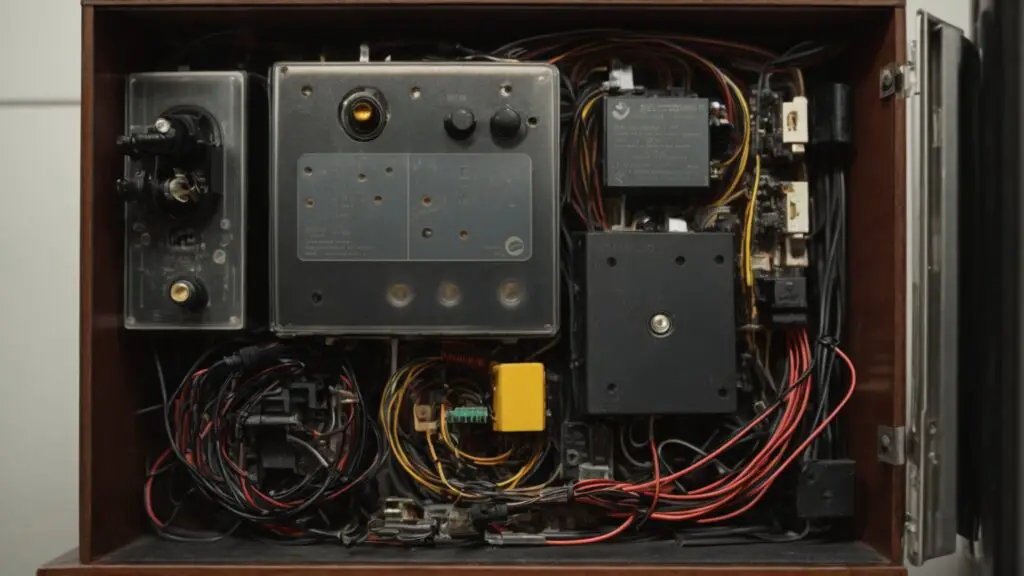
The Real Risks: Can a Buzzing Doorbell Cause a Fire?
In today’s digital age, the safety of our homes is paramount, and understanding the risks associated with common household items is crucial. A persistent buzzing or humming from a doorbell might seem innocuous at first glance, but it could be a harbinger of danger lurking within your walls. Whether your doorbell just buzzes without reason, or you’re experiencing a doorbell humming after installing a Ring device, these signs should not be overlooked. Electrical malfunctions, such as a doorbell buzzing when pressed, could indicate serious wiring issues or a defective transformer, posing a significant fire hazard. It’s essential to recognize these signals early and take corrective action, ensuring the safety and security of your living environment against potential threats.
From Buzz to Blaze: Connecting the Dots
A buzzing doorbell can be like that reckless teen who occasionally speeds – usually, it’s harmless, but sometimes it can end in disaster. Here’s how a mere buzz can escalate:
- Continuous Electrical Current:
- Think of it like a kettle left on a burner for too long; it overheats. Similarly, a consistent flow of electricity can cause your doorbell’s components to heat up.
- Fact Check: Overheating electrical devices account for about 6% of residential fires, per the U.S. Fire Administration.
- Flammable Components:
- Not all parts inside your doorbell are made of metal or ceramic. Some plastics and other materials can ignite if exposed to excessive heat.
- Safety Tip: Opting for doorbells with high-quality components can significantly reduce this risk.
- Ring Doorbells – The Modern Sentry:
- With their sleek design and advanced features, ring doorbells have taken door security to the next level. But the burning question (pun intended) is, are they fire-prone?
- The truth: Like any gadget, a few isolated incidents can happen. However, when installed and maintained correctly, Ring doorbells do not pose any extra fire risk compared to traditional systems.
- Story Break: A friend once shared a WhatsApp forward warning about Ring doorbells causing fires. It turned out it was just another internet myth. It is always best to do our own research!
Remember that Online Rumor? I, too, came across that circulating story about a Ring doorbell catching fire. Instant panic mode, right? But diving deeper was like finding out the villain in a movie had a valid reason for his actions. The incident was due to a rare manufacturing defect, not a widespread problem. It’s essential to separate fact from fear.
Guarding Against the Flames
- Maintenance: Regularly check your doorbell components. Think of it like a health checkup but for your doorbell.
- Quality: Investing a tad more in a good quality doorbell can save you from potential hazards in the long run.
- Installation: When in doubt, get a professional. An expertly installed doorbell minimizes risks.
While a buzzing doorbell might sound like an inconsequential hiccup in our daily lives, it’s a sign worth paying attention to. Not just for peace of mind but also for the safety of our cherished homes.
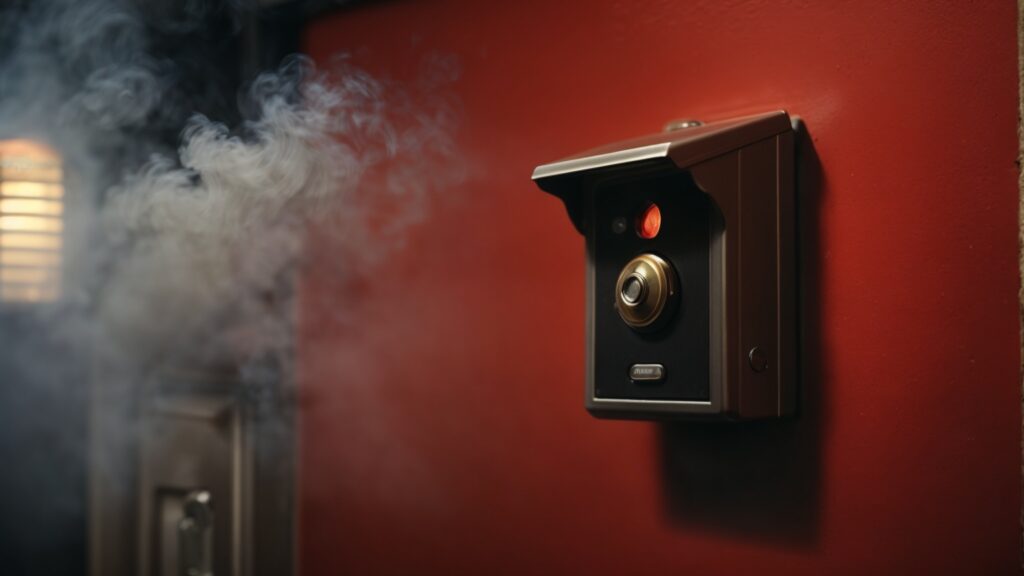
Doorbell Transformers: Are They the Culprit?
Behind every doorbell humming after installing Ring or any standard doorbell lies the unsung hero – the transformer. Often, when homeowners question, “Why is my doorbell buzzing?” they overlook this vital component. A transformer’s role is to convert high-voltage electricity to a lower voltage suitable for your doorbell, ensuring it chimes correctly without overloading the system. However, when my doorbell is making a buzzing noise, it’s a clear indication that the transformer might be failing or is improperly installed. This issue is not just an annoying buzz; it’s a potential safety hazard. If a Ring doorbell causing chime to buzz, it could be due to incompatibility with the existing transformer’s voltage output. Identifying whether is a buzzing doorbell dangerous starts with inspecting the transformer, as a malfunction here can lead to overheating and, in rare cases, fire risks. It’s crucial to address these signs promptly, ensuring the transformer matches your doorbell system’s requirements for a safe and harmonious operation.
Transformer 101: The Unsung Hero
Before we delve into the nitty-gritty, let’s understand this gadget’s role:
- Voltage Regulation: Your doorbell isn’t a power guzzler. The transformer decreases the voltage, ensuring your doorbell gets the right amount.
- Hide & Seek: If you’re hunting for this device, peek into your attic or basement. They love to play hide and seek there!
- Life Span: On average, transformers can last between 15-20 years. But, just like us, they age and sometimes faster if not maintained well.
Why do Transformers Get Hot Under the Collar?
Remember that time when you tried to juggle work, groceries, and picking up the kids from school? Overwhelm, right? Well, transformers can feel the same:
- Age: With years comes wisdom but also wear and tear. An older transformer might struggle to regulate voltage efficiently.
- Overloading: Have you ever tried filling a cup beyond its brim? The same principle applies here. Pushing a transformer beyond its capacity can cause it to overheat and malfunction.
Story Break: My DIY enthusiast brother once tried connecting multiple devices to a single transformer. It worked… for a while. But then the continuous buzzing started.
Lesson learned: respect capacity limits!
Healthy vs. Problematic Transformers: Know the Signs
| Signs | What it means |
|---|---|
| Excessive heat | This could hint at an overload or malfunction. If your transformer feels too hot to touch, it’s a sign. |
| Burnt smell | Ding ding! Immediate attention required. This can indicate a severe problem. |
| Discoloration | It’s like when we spot that first gray hair. It’s a sign of aging or a potential hazard. |
The transformer, while essential, can be a culprit behind that pesky buzz or even more severe issues. But with regular checks and a little TLC, it can serve you reliably for years. Remember, as with all electrical components, always reach out to an expert when in doubt!
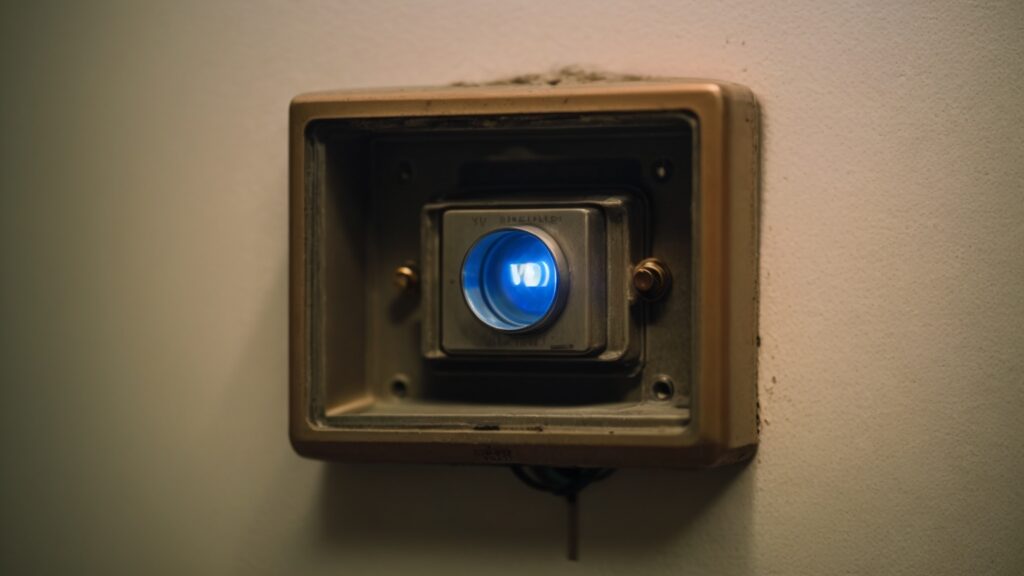
Safety Precautions and Preventative Measures
Your home is your sanctuary, right? It’s the place where you unwind, maybe binge-watch your favorite series, and create countless memories. So, keeping it safe is a top priority. And guess what? A dash of vigilance and a sprinkle of proactive measures can make all the difference regarding doorbells. Understanding the frequently asked questions about why your door bell might not function correctly is the first step. Issues like electromagnetic interference, corrosion, or a malfunctioning coil can affect both the chime or bell. To address these concerns, locate the circuit breaker to prioritize safety before you start any work.
It’s always recommended to consider replacing the entire unit if the transformer can become compromised, as transformer can also be a key factor in ensuring your doorbell’s reliability. Addressing this issue may involve mounting a new fixture or using electrical tape for secure connections. Attach the new, compatible components, like a 24v transformer or door casing, to help reduce any randomly occurring problems. After making the changes, proceed to turn the breaker back on. This proactive approach ensures the longevity and safety of your doorbell system, letting you resolve the problem and sleep more soundly at night.
Installing it Right: The First Line of Defense
As the saying goes, well begun is half done. The right installation can set a robust foundation:
- Voltage Vibes: Your doorbell isn’t too picky but has its preferences. Always make sure the voltage aligns with what your doorbell craves.
- Wiring Wonders: If you’re not an electrical whiz, no worries! It’s always best to rope in an expert to ensure all wires are in their rightful places.
- Connectivity Counts: Imagine wearing loose shoes for a marathon. Not ideal, right? Similarly, ensure all connections are tight and secure. Remember, tight and right is the mantra.
Routine Maintenance: Your Safety Net
You wouldn’t skip a regular doctor’s visit, would you? Your doorbell system requires a bit of that TLC, too:
- Inspection Intervals: Mark your calendar for a bi-yearly doorbell check. It’s like a spa day for your system, ensuring it stays in prime shape.
- Stay Observant: Ever notice how pets have a sixth sense for things amiss? Channel that energy. If your doorbell hums, buzzes, or acts out, take note. Your vigilance might catch a budding issue.
Taking Swift Action: The Safety Seal
Sometimes, despite our best efforts, things go sideways:
- Power Down: If your gut screams that something’s off, listen to it. Disconnect the power to your doorbell system. It’s like hitting the pause button on a potential issue.
- Expert Advice: You wouldn’t self-diagnose an ailment, right? Similarly, call in the experts if your doorbell system shows trouble. Better safe than sorry!
Last winter, while sipping hot cocoa, I chatted with a friend who shared a close call. His doorbell began emitting a low, ominous buzz. Instead of brushing it off, he immediately rang up an electrician. The diagnosis? A minor issue. But catching it early saved him from a more significant, potentially hazardous situation down the line. Sometimes, acting on our instincts and taking prompt action can make a world of difference.
So, there you have it! With these steps in your safety arsenal, you’re all set to ensure your doorbell remains just that—a doorbell and not an inadvertent hazard. Stay vigilant, stay safe!
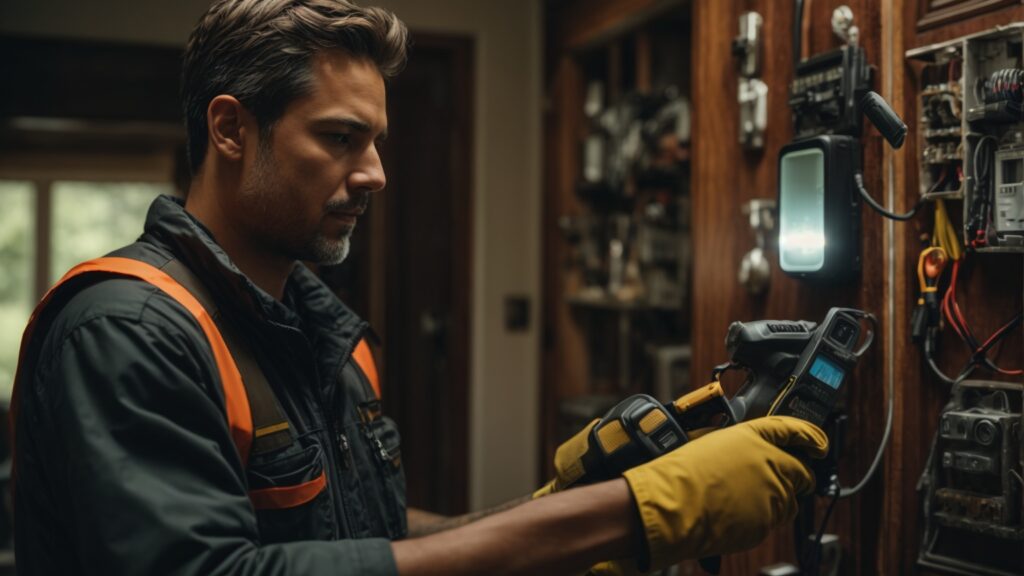
Community Concerns and Real-life Experiences
Ah, the vast world of the internet. It’s a place where we can find a meme for every mood and a treasure trove of experiences shared by real people in real time. Delve into online community forums, and you’ll quickly realize that our buzzing doorbell concern isn’t just a one-off query. It’s a genuine issue that many homeowners grapple with. Let’s wade through the sea of community insights to understand this better.
Buzzed and Bothered: The Electrical Issues
Peruse through threads, and you’ll spot a common narrative:
- The Innocent Buzz: Many started with what seemed harmless, humming from their doorbell. It’s like that one song you can’t get out of your head, but way less fun.
- The Domino Effect: This ‘innocent’ buzzing quickly snowballed into more pressing electrical concerns for some. We’re talking flickering lights, short circuits, and sometimes, a complete system meltdown.
- The Final Verdict: The general consensus? Don’t treat that buzz lightly. Several users pointed out that it’s often the tip of a potentially problematic iceberg.
Brand Banter: Seeking the Safe Bets
As with all products, some brands stand tall, while others, well, don’t:
- Trusted Tags: Many in the community swear by specific brands, touting them as reliable and safe bets for doorbell systems. Users say these brands have stood the test of time and functionality.
- New Kids on the Block: On the flip side, a few emerging brands have garnered attention but with mixed reviews. Some laud them for their innovative approach, while others prefer sticking to tried-and-tested names.
Stories that Stick: Anecdotes from the Alley
There’s nothing like a good ol’ story to drive a point home, right? These anecdotes from real users can be both cautionary tales and enlightening insights:
- John’s Jolt from Reddit: Picture this—you’re enjoying a quiet evening when a faint buzzing starts echoing. That’s what happened to John from Reddit. Initially brushing it off, the buzz became more evident as an electrical issue. His two-decade-old house had a significant wiring problem. Luckily, he took action in time, avoiding a more severe outcome.
- Quora Queries: One user shared how their buzzing doorbell was the early sign of a squirrel nest right above, messing with the wiring! Nature is unpredictable, and so are its consequences on our man-made systems.
In the realm of home safety, where each component plays a critical role, the stories that echo through our communities often serve as a vital learning resource. Among these, the narrative surrounding the doorbell transformer holds a particularly intriguing place. Time and again, homeowners have shared their experiences, underscoring a pivotal question: can a doorbell transformer cause a fire? These real-life anecdotes paint a vivid picture of how a seemingly minor issue, like an unnoticed doorbell transformer buzzing, can spiral into a significant safety hazard.
There have been instances where a neglected transformer, pushed beyond its limits, has led to situations that prompt homeowners to ponder, can a doorbell transformer cause a fire? Each story, shared across forums and neighborhood gatherings, reinforces the importance of not only recognizing but also addressing the earliest signs of electrical issues in our homes. These tales, while sometimes overlooked, are essential reminders of the necessity to remain vigilant and proactive in maintaining the safety and integrity of our living spaces.
- Product Dimensions : 2.34 x 2.55 x 1.92 inches; 1.57 Pounds
- Item model number : 8EAGS7-0EN0
- Date First Available : September 15, 2019
- Manufacturer : Ring
- ASIN : B07H4VQPK3
Conclusion
As we reach the end of our comprehensive exploration into whether can doorbell transformer cause fire, it becomes evident that this concern, though often overlooked, is a significant aspect of household safety. The intricate dance of electricity within our homes, symbolized by the seemingly innocuous buzz of a doorbell, can indeed be a signal of deeper electrical issues. From the doorbell chime humming after Nest install to the Ring doorbell humming, each sound serves as a potential indicator of electrical mishaps that could, in rare cases, escalate to fire hazards.
Particularly noteworthy is the role of the doorbell transformer. Queries like can a doorbell transformer cause fire or doorbell transformer vibrating are not just theoretical concerns but real possibilities that demand attention. The subtle nest doorbell humming or a google nest doorbell buzzing could be symptomatic of underlying issues, highlighting the importance of regular maintenance and awareness. It’s crucial to understand that while instances like can doorbell wires start a fire are rare, they are not entirely out of the realm of possibility, especially if signs like a nutone box on wall buzzing or doorbell transformer humming are ignored. Thus, it becomes imperative to not only acknowledge these signals but also to act on them – be it through troubleshooting methods like how to hide doorbell wires or understanding will doorbell wires shock me for safe handling.
In conclusion, the journey through the nuances of doorbell-related safety illuminates the delicate balance between technological convenience and the vigilance required to maintain it. By staying alert to the signs, such as a doorbell chime buzzing after installing Ring, and adhering to safety protocols, homeowners can ensure that their doorbells, while an integral part of their homes, remain harmless and functional. It is through this blend of knowledge and action that one can truly find peace of mind in the chime of their doorbell.

James Dunnington leads the James Dunnington Collection, featuring five unique blogs: a practical Pet Care Guide, an enlightening Ancient History Blog, a resourceful Home Improvement Guide, a cutting-edge Tech Innovation Guide, and a strategic Online Money Making platform. Each site delivers valuable insights designed to empower and inform. For updates and more tips, visit our Contact Us page to sign up for our newsletter, ensuring you never miss out on the latest content from any of these dynamic fields.
